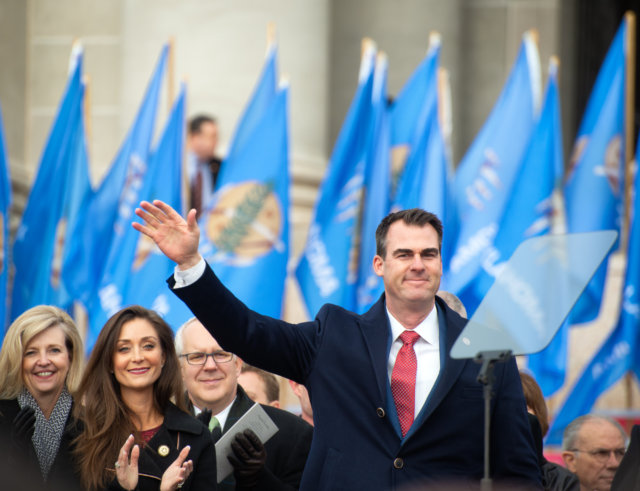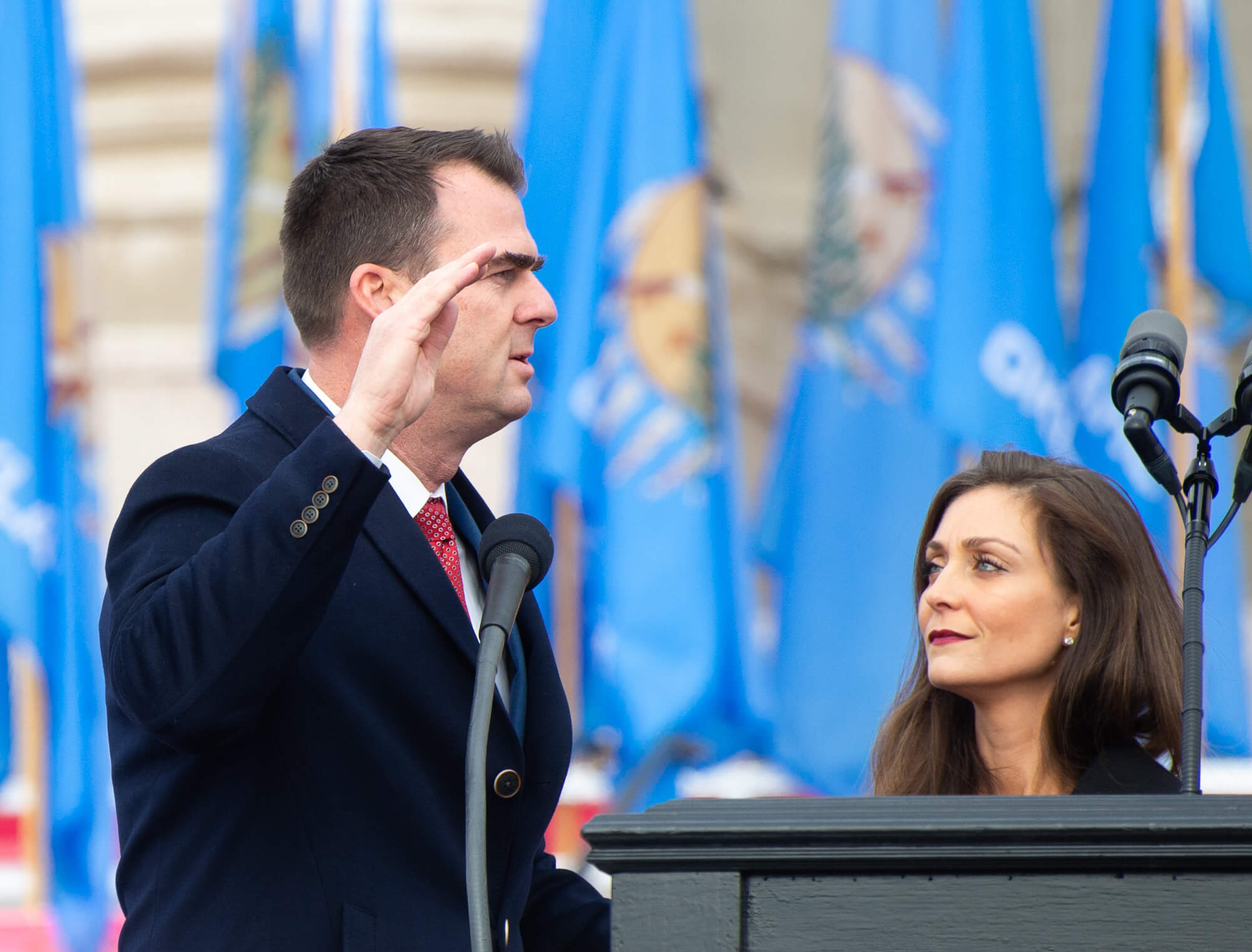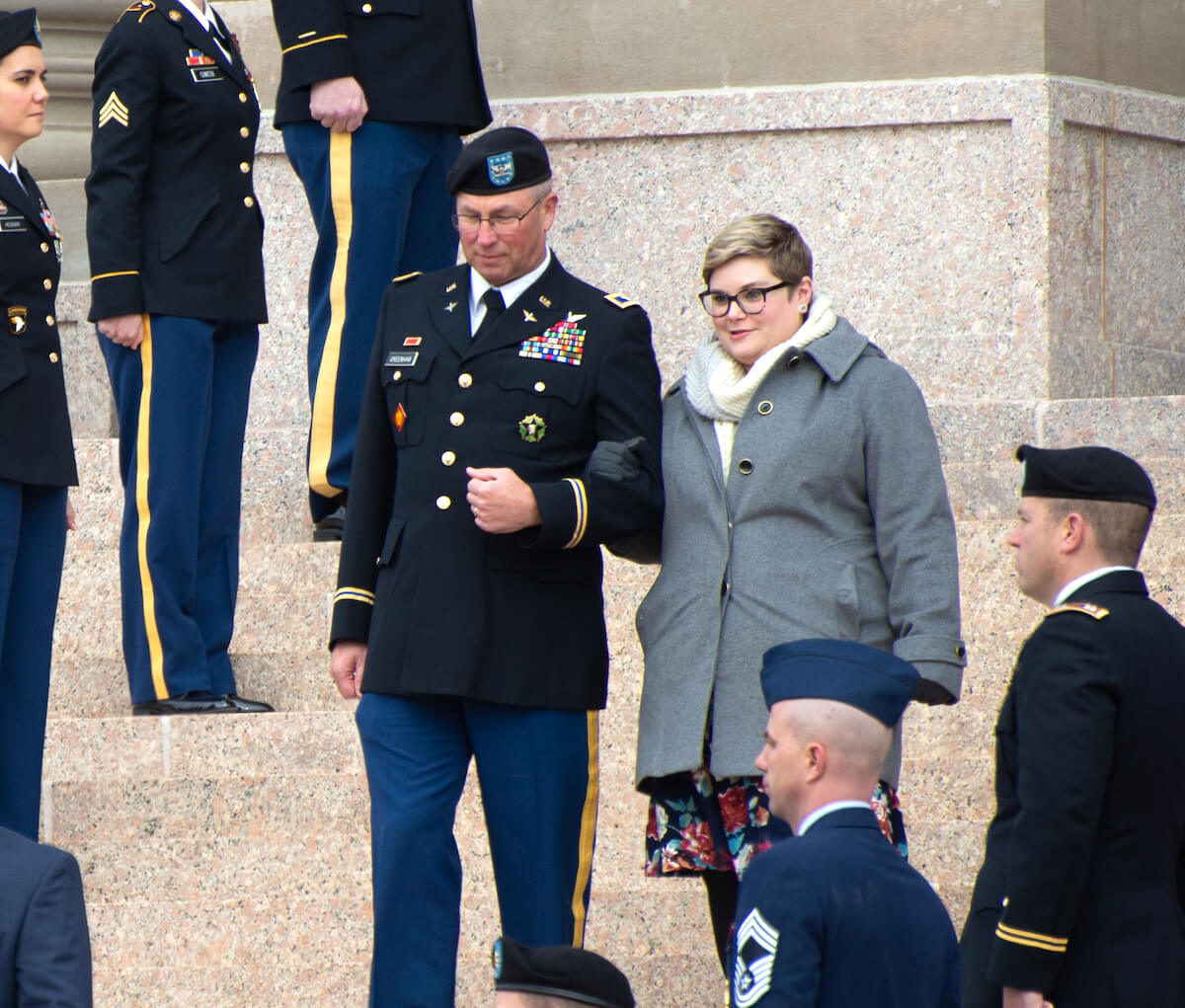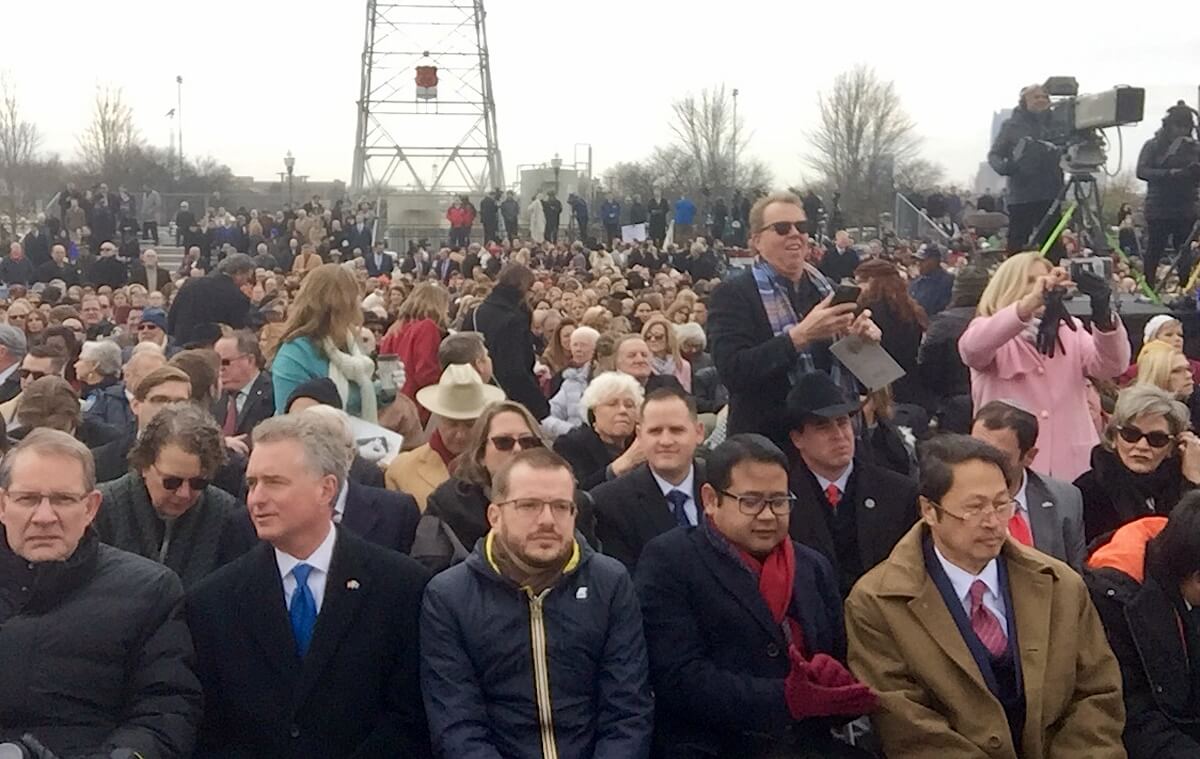

Tulsa businessman Kevin Stitt became Oklahoma’s 28th governor today, delivering a speech that continued his campaign narrative while fleshing out a goal for state agencies’ accountability.
Ahead of Stitt’s remarks, legislators from both parties expressed optimism about a host of issues, ranging from Stitt’s policy priorities to his personality.
“What I want to continue to hear is not really what is said in the campaign speeches but what happens behind the scenes,” House Majority Floor Leader Jon Echols (R-OKC) said as he entered the State Capitol early Monday morning. “Right now, we have a better working relationship with the executive than we’ve had since I’ve been up here. He seems to really have a desire to both say where he wants the state to go but also listen on the legislative side. If that continues, he will be an incredibly successful governor.”
Stitt becomes Oklahoma’s first top executive since Gov. David Walters to enter the position without previously having held office, leaving plenty of questions about the political and policy narratives he will attempt to craft in the coming weeks, months and years.
Echols and other lawmakers acknowledged Stitt’s steep learning curve as a political outsider, but they also expressed hope that he will listen to the broad needs of Oklahomans.
“I think the biggest plus for Gov. Stitt is he’s coming in having never served in office. I think he has been successful at the things he has put his hand to business-wise,” House Speaker Charles McCall (R-Atoka) said Monday morning. “He comes from a background where he’s used to getting things done, and he measures performance.”
Democrats had similar hopes for the new governor.
“Because he’s not a ‘politician,’ or hasn’t been really wrapped up in a party and rhetoric, hopefully he will learn the issues and make decisions based on facts as opposed to political ideology,” Rep. Cyndi Munson (D-OKC) said Monday morning. “My hope is that he will really engage in conversation about education and health care and criminal justice reform. We cannot be a top-10 state when we do not invest in our future, which is our kids.”
‘I see a top-10 Oklahoma’

Stitt’s use of the phrase “top-10 state” and “Oklahoma’s turnaround starts right here, right now” punctuated his longshot gubernatorial campaign, and his speech Monday indicated the phrases will continue to frame his narrative as governor. He referenced the “top-10” phrase in the first minute of his remarks, and prior to the ceremony, a public address announcer encouraged the gathered crowd to use #OKTurnaround in social media posts about Stitt’s inauguration.
“Like you, I was frustrated. Like you, I am motivated,” Stitt said from the Capitol steps after being sworn in shortly after noon. “I see untapped potential. I see opportunity. I see great men and women around me. I see promises to be kept. I see jobs. I see progress. I see a top-10 Oklahoma.”
Stitt said his 18 months on the campaign trail and his 300-plus town halls in 77 counties revealed a “mandate” from the people of Oklahoma.
“Here’s what I heard. We know we can be and should be a top-10 state. Why? Because we are Oklahoma, proud of our hard-working, God-fearing people,” Stitt said.
Echols praised Stitt’s narrative use of the “top-10” phrase.
“I think campaigning on making Oklahoma a top-10 state is very exciting because that’s a commitment to deliver specifics,” Echols said. “That’s a commitment to figure out what the metrics are that we want to judge and then to judge yourself by whether you raise those metrics. So it’s really exciting to have somebody who has such aggressive plans for the state.”
Stitt talks education, agency accountability
Stitt discussed the state’s top political issue of recent years.
“Oklahoma’s turnaround also starts with education,” he said.
But he also emphasized the value of fiscal prudence and state agency efficiency in an attempt to “maximize our services while creating an efficient process that allows us to do it at the lowest possible cost.”
“We can only guarantee such accountability when state agencies understand that they exist to serve and to answer to the people of Oklahoma. We need to change how Oklahoma’s 400 agencies and commissions are comprised,” Stitt said. “Our current system gives agencies too much independence from the voter. They have the ability to ignore executive orders, skirt around laws passed by the Legislature, hide pockets of money and protect their own interests by hiring lobbyists. To my fellow Oklahomans, this must change if we are going to move the needle.”
Beyond education and state government reform, House Minority Leader Emily Virgin (D-Norman) said Oklahoma faces other pressing issues that she hopes Stitt will work to address.
“Something that he talked about a lot on the campaign trail was criminal justice reform, and I think he’s continuing to talk about it,” Virgin said. “So that’s something I am hopeful he will continue to be serious about. We have heard a lot of lip service on that in the past and haven’t gotten a whole lot done in terms of our current prison population.”
Sen. Roger Thompson (R-Okmulgee), the Senate Appropriations and Budget Committee chairman, echoed Echols in praising the Stitt administration’s positive working relationship with the Legislature so far.
“There’s a lot of optimism that we are going to be able to do some things. I think we need to realize government needs to have a fresh look,” Thompson said. “At the same time you can’t run everything in government like a business. In my business, if I have an item that’s not selling, I quit selling it. In government, you can’t do that. You still have prisons, health care and those type of things. So I think that’s going to be a challenge for him to take a look at.”
Republican, Democrat both seek Medicaid conversation

Asked what he hopes Stitt will recognize as a challenge for rural Oklahoma, Thompson answered quickly.
“Health care,” he said. “That’s our number one issue right now in rural Oklahoma.”
To that end, the state’s most controversial policy discussion concerning health care centers around SoonerCare, Oklahoma’s Medicaid program for low-income citizens.
For nearly a decade, conservative lawmakers have pushed for versions of managed care intended to lower costs. Over the same period, Democrats and self-described “pragmatic” Republicans have pushed for the acceptance of additional federal dollars under some version of the “Medicaid expansion” authorized by the Affordable Care Act.
Thompson and Virgin both said they hope Stitt will be open to finding a compromise to increase health insurance coverage through Medicaid.
“There needs to be a discussion about that. I agree we need to have all the federal dollars we can,” Thompson said. “I have been wanting to have that discussion since I was elected in 2014, so I am looking forward to that discussion.”
Virgin said House Democrats want to find an agreeable plan, too.
“I think our caucus has made it very clear that we are willing to negotiate around the issue,” she said. “I think it’s clear that there is a movement forming for a ballot initiative in 2020, and I think that gives us even more motivation to try to get it done legislatively because if we do it through the ballot initiative, we won’t have any input on it. So I think it’s important for Republicans and Democrats to sit down and talk about what the program looks like and make sure we can get it done in a way that will work.”
Virgin said she believes Stitt’s business background could lend him an open mind on Medicaid expansion, which would be funded 90 percent by federal dollars and 10 percent by state dollars.
“Gov. Stitt comes from a business background, and in his business if someone said, ‘I’m going to give you $9 if you put up $1,’ I think that’s a deal he would take. It just makes sense,” Virgin said.
Lawmakers value ‘open dialogue’ with executive

Stitt enters office with an enormous number of new lawmakers who face an equally steep learning curve.
“I feel like there are a lot of unknowns with so many faces in the Legislature along with having a newly elected governor who wasn’t really involved in politics much before,” said Rep. Kelly Albright (D-Midwest City). “I am hopeful we are able to find some common ground. It can’t really be worse than what it has been.”
Echols identified two keys to Stitt being able to retain his initially positive relationship with the Legislature after session begins Feb. 4.
“One key is remembering we all wear the same jersey, and I don’t mean Republican. I mean Oklahoman,” he said. “We are all Oklahomans, and we all care about what’s going on for this state. Number two is communication. We want there to be open dialogue between the executive branch and the legislative branch, and that’s what we’ve been experiencing.
“As long as we have that reminder that we all wear the same jersey and we continue to communicate well, this is going to be a great four years.”




















